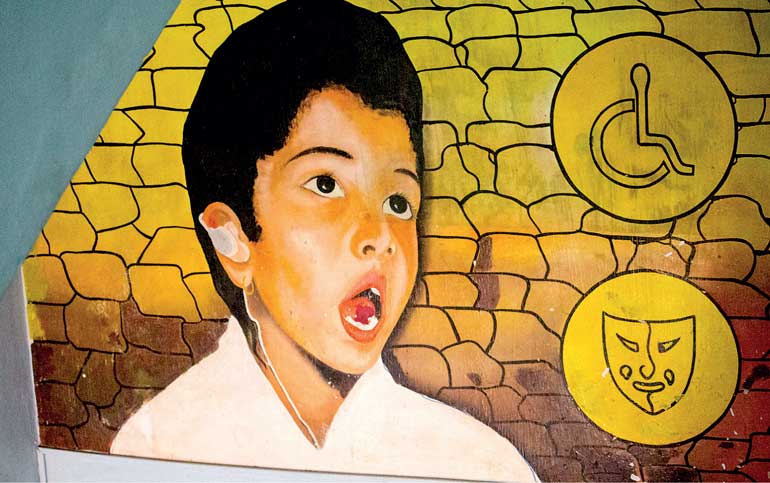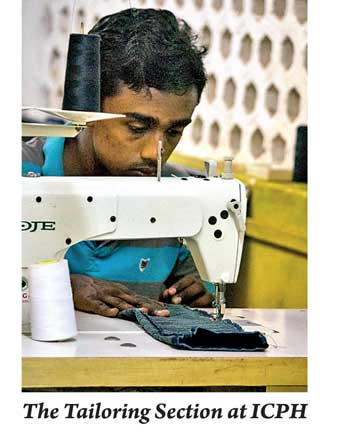Sunday Mar 01, 2026
Sunday Mar 01, 2026
Saturday, 30 December 2017 00:00 - - {{hitsCtrl.values.hits}}

By Aysha Maryam Cassim
It was just another school day at Doolmala Islamic Centre for the Physically Handicapped (ICPH).
I spotted a few children scattered around the playground, conversing and giggling with their friends. Teachers were walking in and out of the office. Reports were being marked and handed over to the principal. It’s the time to wrap up for 2017. Children of Doolmala were getting ready to go home for the December holidays.
What makes Doolmala ICPH special?
For the last 33 years, Doolmala Centre for the Physically Handicapped has been shining light on the lives of special children, providing education, vocational training and rehabilitation services for special children aged five to 18.
Established as Islamic Centre for Physically Handicapped at Doolmala, Thihariya in the Gampaha District of Sri Lanka, this Government-approved charity organisation is registered as a Non-Governmental Organisation under the Voluntary Social Service Organisation Act No. 31 of 1980 of Sri Lanka.
Access to life
The beneficiaries of this institute are visually and physically handicapped. There are nearly 150 children with hearing and speech impairments. The rest have learning difficulties.
The centre renders great services to them by providing full-time education from primary to secondary level in coordination with the public examinations, which are conducted by the Department of Examination.
Extra-curricular activities include sports, aesthetics and yoga sessions that cater to children with autism, cerebral palsy, Down syndrome and slow learners. Students above 16 are also trained in numerous vocational courses such as gemmology, Juki tailoring, printing, carpentry and bakery and they are subjected to assessment.
Anoma Walisundara – a teacher of M/R Department – has been working with Doolmala for 26 years. She provides vocational training in different disciplines of home science and home-based industrial crafts such as candle-making, crochet and paper quilling for male and female students aged 17-24.
Approximately 12 batches of students with physical and mental disabilities have successfully completed their training courses and are currently self-employed. Upon completing the Juki and gents’ tailoring, students receive a brand new, high-quality sewing machine courtesy of the Department of Social Service.
Current President of ICPH, S.I.M. Haleel, was kind enough to spare some of his valuable time during work hours to talk about the story and future of Doolmala.
 The conception
The conception
The Islamic Centre for the Physically Handicapped was established in a rented house with only one teacher and five students on 3 May 1984. While working in a printing press, Haniffa lost his toes in an industrial accident. Being physically incompetent and mentally devastated, he realised the value and the need of occupational rehabilitation.
It was late N. Jiffry Haniffa’s (Founder and former President of ICPH) idea that gradually grew into a fully-fledged institute over the last three decades. In 1984, the ICPH was officially opened to every Sri Lankan child with special needs. The institute received around 280 applications from all over the island.
At present, the centre spans over a land of 80 perches, providing full-time resident training for more than 250 students appropriate to their functional and cognitive capacity.
Special education
Doolmala ICPH follows the same educational curriculum implemented by the Government of Sri Lanka. While physically handicapped students are given a formal education, the visually and hearing impaired students receive a special education.
Nasman Nalawansa, a product of ICPH, has been working as a teacher in the primary section for the past 18 years. Students are taught in Braille. He uses innovative and interesting methodologies to make his lessons interesting.
I sat through a 6th Grade English class in the hearing impaired section. The classes were meticulously decorated with posters and study-aids. Apart from sign language, teachers incorporate cued speech and lip reading into their learning strategies.
Students are being taught in four different languages, including Sinhala, Tamil, English and Arabic (optional). At the National Institute of Education in Maharagama ICPH teachers receive a formal training in Sign Language and Braille. The Government Teachers Training College provides annual training that ensures that they meet the necessary standards and requirements of the State education system.
Japan International Cooperation Agency (JICA), Canadian Executive Service Organisation, The British and Australian High Commissions, NORAD, Project Trust, VSO volunteers and many other international organisations have given their immense support for the purpose of upgrading the education at ICPH.
“Enable” all
Doolmala Centre’s main objective is not to provide a high-standard education or training for every child with a disability, but to enable them to strive for a better and comfortable life by grooming them to be self-reliant, independent individuals in the society.
There are around 40 teachers in this institute who commit their best to facilitate the development of these children and hone whatever creative and entrepreneurial skills they possess.
From a very young age, Children are familiarised with their disability so that they may learn to develop themselves despite their impairments and become competent citizens out in the society. Plaques and awards at the office lobby reveal the significant achievements of ICPH during the last 30 years.
Two visually impaired students at ICPH who graduated from the Colombo University obtained appointments in the public sector. A hearing and speech impaired student who has successfully completed his higher education in Sign Language at Hong Kong University currently works as a lecturer and analyst at the Sri Lanka Deaf Federation. Today. ICPH has proved its worth across the globe and stands out as a place that believes in the ability of disability.
Regular subsidies and grants provided by the Ministry of Education, the Department of Social Services and the Provincial Council of the Western Province and periodical donations by philanthropists keep ICPH moving forward. Along with financial aid and assistance, a good heart, and a staggering amount of patience are needed to make a difference in the life of a special child.
